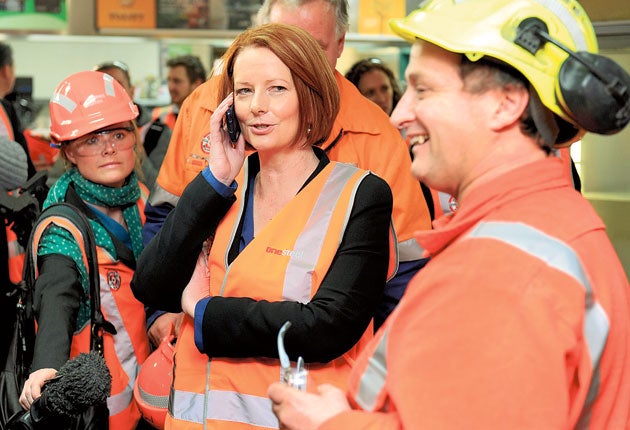Carbon tax makes Gillard Australia's least wanted
Her green agenda has made the nation's PM its least popular leader in decades. In Sydney, Roger Maynard reports on the backlash

Your support helps us to tell the story
From reproductive rights to climate change to Big Tech, The Independent is on the ground when the story is developing. Whether it's investigating the financials of Elon Musk's pro-Trump PAC or producing our latest documentary, 'The A Word', which shines a light on the American women fighting for reproductive rights, we know how important it is to parse out the facts from the messaging.
At such a critical moment in US history, we need reporters on the ground. Your donation allows us to keep sending journalists to speak to both sides of the story.
The Independent is trusted by Americans across the entire political spectrum. And unlike many other quality news outlets, we choose not to lock Americans out of our reporting and analysis with paywalls. We believe quality journalism should be available to everyone, paid for by those who can afford it.
Your support makes all the difference.Support for the Australian government hit an all-time low yesterday amid a growing public backlash against a controversial carbon tax which threatens to derail the leadership of Prime Minister Julia Gillard.
Plummeting poll ratings for Mrs Gillard suggest that she has borne the brunt of voter anger at a plan – designed to punish the worst polluters – that many fear will devastate the economy as the country scrambles to deal with the effects of climate change.
Australia relies on cheap coal for power generation but in the process has become the developed world's worst producer of greenhouse gases. As the Labor Party launched an £8m advertising campaign to try to sell the policy to a sceptical public, a Herald/Nielsen survey revealed that only 26 per cent would vote Labor – the smallest figure for either of the main parties in the four-decade history of the poll.
Gillard's personal rating sank, showing her well behind the opposition leader Tony Abbott, a poor campaigner at the last election who appears to have benefited from his criticisms of the plan. "There is just one reason [for the poll result]," said John Stirton, director of Nielsen Poll. "The carbon tax is alienating voters like nothing before it."
Mrs Gillard's credibility has been badly damaged since she broke a pre-election pledge last year not to introduce a carbon tax. Last week, she announced an A$23 (£15.20) per ton carbon levy to run for two years. About two-thirds of the proceeds would go to some of the worst-hit consumers through tax cuts, in an attempt to stem opposition to the measure.
She has defended her U-turn by accusing the opposition of "word games" for political advantage and denying that the tax will lead to large price rises for household energy bills.
However, the majority of voters still oppose the plan and big business has launched a vociferous campaign against the changes.
The new tax will be paid by about 500 of the nation's biggest polluters, with mining companies and airlines expected to be among the worst hit.
It will take effect from next July and be followed by the introduction of a market-based emissions trading scheme in 2015, which penalises polluters but rewards those who reduce their greenhouse gas emissions.
For Australia's Welsh-born Prime Minister, whose approval rating makes her as unpopular as former Labor leader Paul Keating, the past 12 months have been a political disaster. Once lauded for becoming the country's first female Prime Minister, she has fallen victim to an issue that has dogged both sides of Australian politics for years.
Climate change and how to deal with it plagued the previous right-wing coalition government under John Howard and, more recently, former Labour Prime Minister Kevin Rudd. While Rudd ratified the Kyoto Protocol and supported an emissions-trading scheme, he was dumped by his party to make way for the seemingly more electorally appealing Mrs Gillard.
Now she fighting for her political life, with many wondering how long she will survive in office if Labor's troubles continue in the run-up to the next election, due in two years.
Last week she insisted that she was there for the long haul, hoping that people would "change their minds" when given the full facts about her plans to attempt to alleviate the worst effects of global warming.
"When it became clear the only way to achieve action on climate change was to introduce a temporary carbon tax before moving to an emissions trading scheme, the choice was this and the choice was clear," she said.
"I either stuck exactly to what I said before the election, got no action on climate change, and did the wrong thing for our nation, or I found a way to get climate change, to do the right thing for our country and to deal with the consequences. Nothing gets easier by putting it off and if you don't do what is right for the nation, then you shouldn't be Prime Minister."
Join our commenting forum
Join thought-provoking conversations, follow other Independent readers and see their replies
Comments